In this article:
When it comes to taking care of your hair, you have an overwhelming range of products to choose from. Two not-so-known options for treating your hair are hair masks and hair butters.
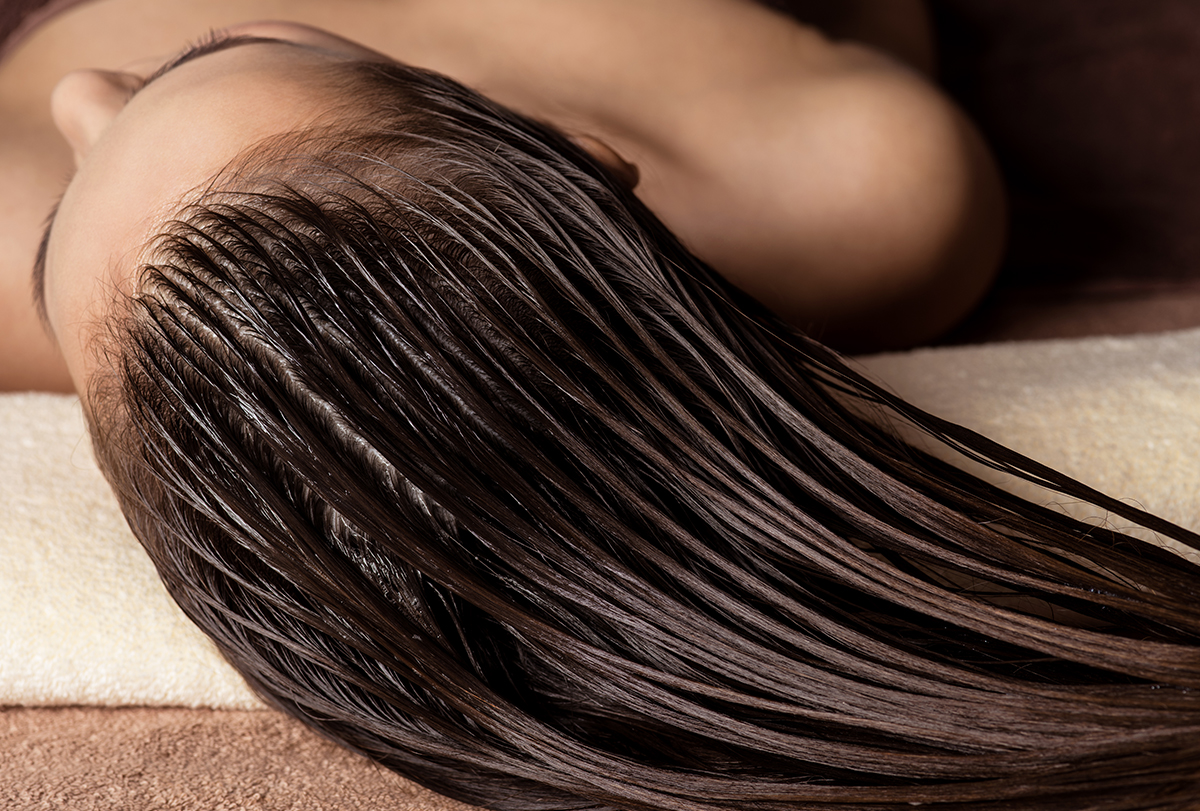
Hair masks are deep-conditioning treatments that provide intense hydration and help repair damaged hair, (1) while hair butters are rather thick products that offer deep moisturization and protect the hair from frizz or dryness.
Both hair masks and hair butters can be helpful in improving hair health and enhancing the appearance of your hair.
Continue reading to know which one you should choose.
Hair Mask or Hair Butter: What to Choose?
| Hair Mask | Hair Butter |
|---|---|
| Provides deep conditioning | Offers intense moisturization and nourishment |
| Restores moisture and hydration | Helps with hair manageability and control |
| Can address specific hair concerns | Enhances hair shine and helps style hair |
| Suitable for various hair types | Suitable for curly hair |
| Typically used once or twice a week | Can be used more frequently for styling |
| Requires rinsing off after use | Does not necessarily require rinsing |
Consider these factors when deciding which product is made for you.
Hair type
Hair masks are generally suitable for both curly and straight hair types. If your hair is dry, damaged, or lacks moisture, a hair mask would be a better choice as it provides intense hydration and deep conditioning.
Hair butters are ideal for thick, coarse, or curly hair types as they help to soften and define curls while providing nourishment and moisture.
Hair color
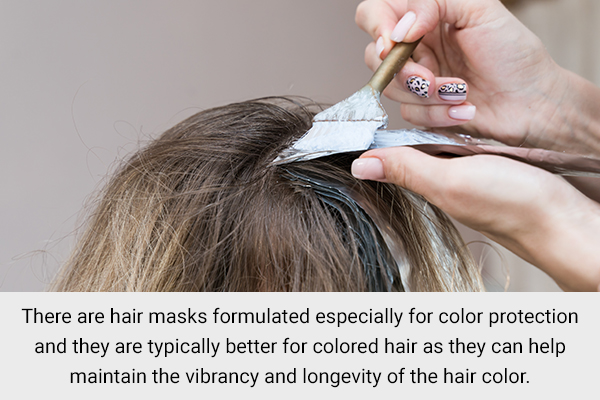
There are hair masks formulated especially for color protection and they are typically better for colored hair as they can help maintain the vibrancy and longevity of the hair color. So, a hair mask specifically made for color-treated hair is a better choice than hair butters.
Dandruff-prone hair
A hair mask with antidandruff properties is typically better than hair butters for addressing dandruff and soothing a dry scalp.
Hair needs
If you’re looking for a product to repair and strengthen your hair, hair masks are the answer as they are designed specifically for these purposes.
Also, certain hair masks may contain ingredients that promote hair growth and strengthen the hair follicles, making them potentially better for addressing hair loss. (1)
Hair butters, on the other hand, are more focused on moisturizing and nourishing the hair.
Frequency of use
Hair masks are typically used once a week or as needed, while hair butters can be used more frequently for daily moisture and styling.
Styling
If you frequently use heat styling tools or expose your hair to harsh environmental conditions, choose hair masks as they can provide added protection and repair.
Hair butters, on the other hand, help to maintain your hairstyle and enhance hair shine.
What Actually Is a Hair Mask?
A hair mask is a wonderful product that helps moisturize and improve the health of your hair. Great hair adds to your overall appearance and boosts your confidence.
Hair masks are particularly beneficial for dry or damaged hair. If your hair is thin or is in bad shape, using hair masks can make a noticeable difference. They work by moisturizing and nourishing the hair and scalp. (1)(2)
Hair masks come in different forms such as shampoos, conditioners, 2-in-1 combinations, and standalone masks. These products are typically rinsed off, but there are also leave-in conditioners and masks available, resembling hair creams or serums. (3)
While there are many hair masks available today, some of them contain chemicals that can be harmful to your hair. So, it is best to opt for herbal hair masks.
Note: You can also make your own hair mask at home using simple ingredients. The best part is that these homemade hair masks hardly have any disadvantages and offer numerous benefits. (1)
What Actually Is a Hair Butter?
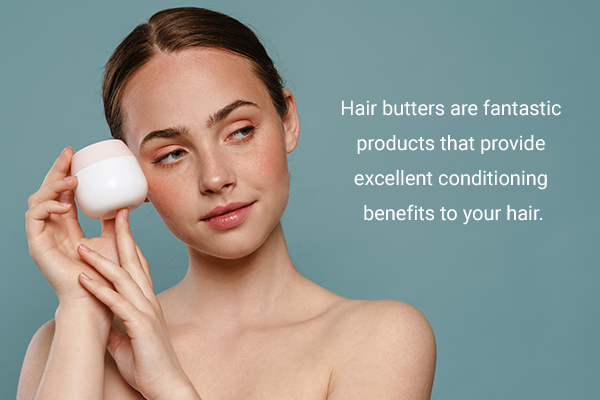
Hair butters are fantastic products that provide excellent conditioning benefits to your hair. They work by utilizing different oils with specific molecular characteristics to improve the health and appearance of your hair.
When it comes to reducing split ends, improving combing resistance, and enhancing gloss, all oils in hair butters show great performance. The key factor influencing their effectiveness is how well they form a film on your hair. (4)
Hair butter usually contains these ingredients: (4)
- Buriti oil – It is rich in oleic acid, which can give your hair a smooth surface and a reflective shine.
- Ucuúba butter – It has a high content of low molar mass triglycerides and straight-chain fatty acids and can slightly increase the strength of your hair.
- Coconut oil – It is known for its high lauric acid content, which is good for hair health.
By using hair butters, you can take advantage of the unique properties of different oils to improve the condition and appearance of your hair. They can make your hair more manageable.
DIY Hair Masks You Can Make at Home
The next time you want to pamper your hair, try preparing your own hair masks using ingredients you already have at home.
Fenugreek seeds, aloe vera gel, and fuller’s earth hair mask
This homemade herbal hair mask offers multiple benefits for your hair. It moisturizes and soothes the scalp, strengthens the hair strands, reduces hair fall, enhances shine, cleanses the scalp, moisturizes the hair, improves blood circulation, and leaves your hair clean, soft, and revitalized. (1)
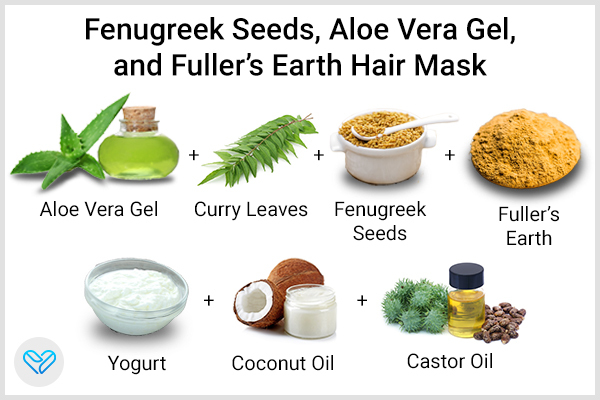
Steps to make this mask:
- Wash two leaves of aloe vera and scoop out the gel into a container.
- Add 10-15 washed curry leaves, 2 teaspoons of fenugreek seeds, 1 teaspoon of fuller’s earth, and 2 teaspoons of yogurt.
- Grind all ingredients in a mixer to form a paste. Transfer the paste to a bowl.
- Mix 2 teaspoons of coconut oil and ½ teaspoon of castor oil.
- Add the oil mixture to the bowl and mix well to combine.
- Apply the paste to your hair from the scalp to the hair ends, gently massaging the scalp.
- Leave it on for 30 minutes.
- Wash your hair with diluted shampoo.
Red rice mask
Red rice offers antibacterial effects, helps prevent hair fall, and strengthens the hair. Egg white conditions the hair, while coconut oil nourishes the scalp.
Together, these ingredients work to improve the overall health and condition of the hair, promoting strong and nourished strands. (2)
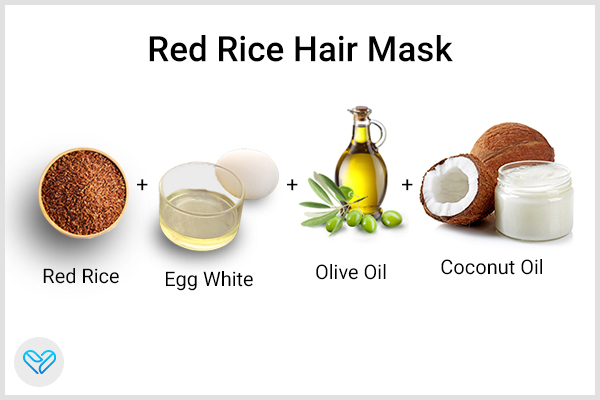
Steps to make this mask:
- Soak 25 g of red rice in water for 48 hours.
- Strain the fermented water.
- Whisk the egg white of 1 egg until fluffy.
- Grind the soaked rice with fermented water to create a thick paste.
- Combine all ingredients with 1 tbsp each of coconut and olive oil.
- Apply the mask from the scalp to the hair ends.
- Leave it on for 10-15 minutes.
- Wash your hair with a shampoo when done.
How to Use a Hair Mask?
Follow these steps to apply a hair mask:
- Apply the hair mask to clean and slightly wet/damp hair, focusing on the mid-lengths and ends.
- Massage it into your scalp gently and comb through your hair.
- Leave the mask on for the required amount of time.
- Rinse your hair thoroughly with normal water.
How to Use a Hair Butter?
Follow these steps to use a hair butter:
- Take a small amount of hair butter in your hand.
- Rub your hands together to melt the butter slightly between them.
- Apply the hair butter to clean but completely dry hair, focusing on the lengths and the ends.
- Style your hair as desired.
- Leave the hair butter in your hair and let it be absorbed.
Is It Okay to Use Both Hair Masks and Hair Butters?
Yes, you can use both a hair mask and hair butter as part of your hair care routine. Start by applying the hair mask to clean, wet hair and leave it on for the recommended time. Then, rinse it out and apply a hair butter to dry hair.
Caution When Using Hair Masks and Hair Butters
Experts advise avoiding excessive use of hair masks or hair butters as it can lead to product buildup and weigh down the hair. Plus, overusing hair butters can make the hair greasy.
Thus, it’s important to use them sparingly.
Most-Asked Questions
Are hair masks suitable for all hair types?
Yes, hair masks can benefit all hair types.
Can hair masks and hair butters help with frizz?
Yes, both hair masks and hair butters can help tame frizz and make the hair more manageable.
Can hair butters make my hair greasy?
Hair butters are rich in oils, so using a small amount and avoiding the scalp can help prevent greasiness.
Can hair masks and hair butters help with dry scalp?
Yes, they can provide hydration to the hair.
Final Word
Both hair masks and hair butters have unique benefits. The choice between the two ultimately depends on individual hair needs and preferences. Experimenting with both can help determine the most effective solution.
- Was this article helpful?
- YES, THANKS!NOT REALLY


